Unit5 What can we learn from others 第2课时 语法知识及拓展 课件(共23张PPT)
文档属性
| 名称 | Unit5 What can we learn from others 第2课时 语法知识及拓展 课件(共23张PPT) |
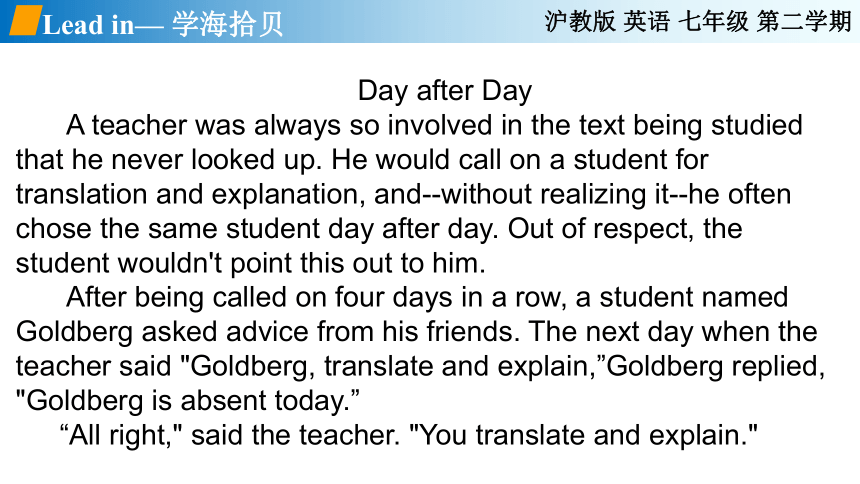
|
|
| 格式 | pptx | ||
| 文件大小 | 776.9KB | ||
| 资源类型 | 试卷 | ||
| 版本资源 | 牛津上海版(试用本) | ||
| 科目 | 英语 | ||
| 更新时间 | 2022-03-09 18:30:01 | ||
图片预览



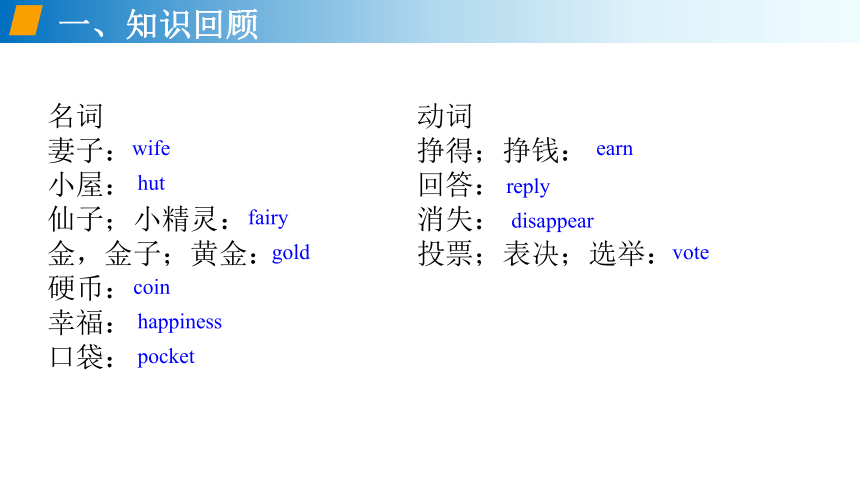
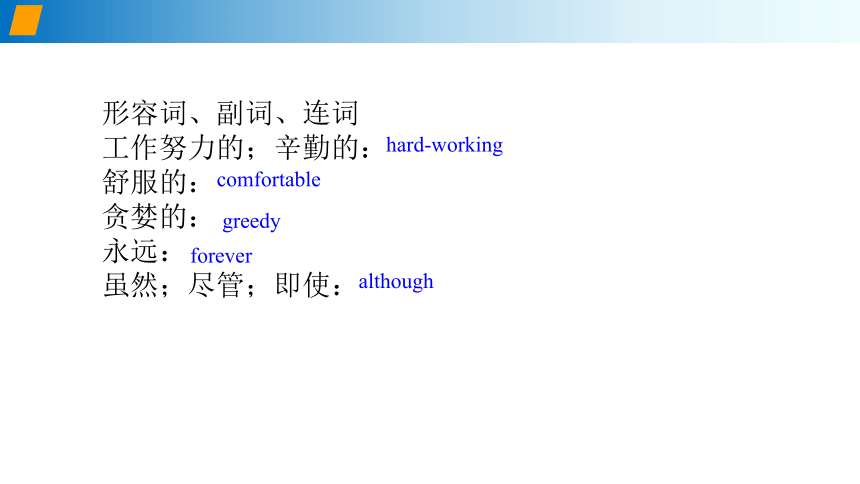
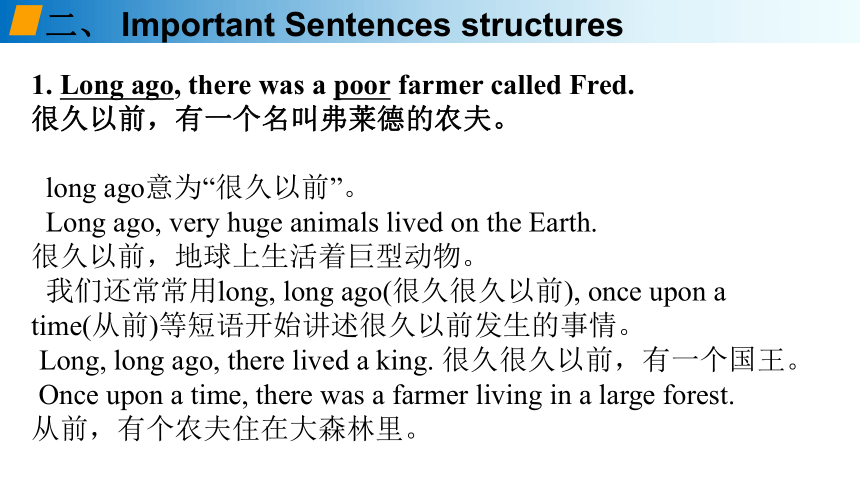
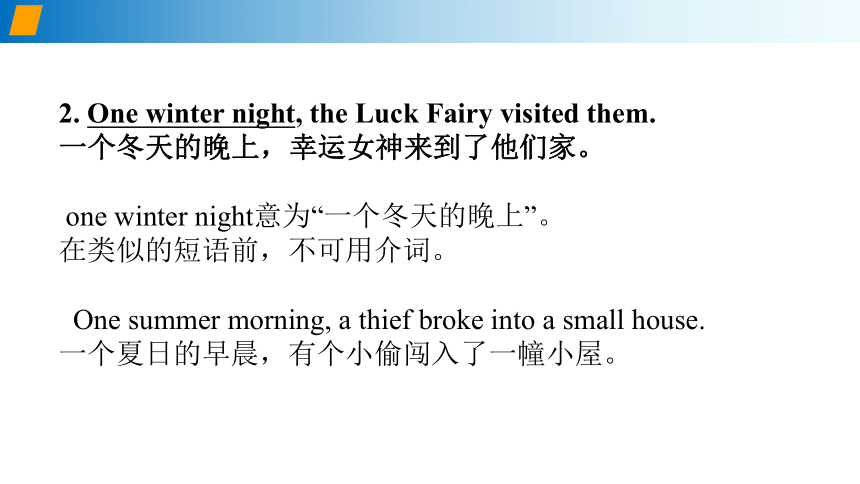

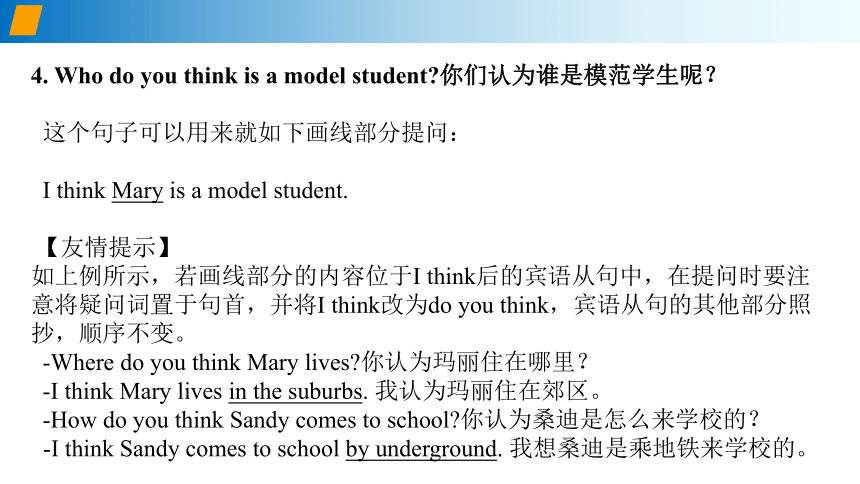
文档简介
(共23张PPT)
Day after Day
A teacher was always so involved in the text being studied that he never looked up. He would call on a student for translation and explanation, and--without realizing it--he often chose the same student day after day. Out of respect, the student wouldn't point this out to him.
After being called on four days in a row, a student named Goldberg asked advice from his friends. The next day when the teacher said "Goldberg, translate and explain,”Goldberg replied, "Goldberg is absent today.”
“All right," said the teacher. "You translate and explain."
沪教版 英语 七年级 第二学期
Lead in— 学海拾贝
沪教版 英语 七年级 第二学期
Lead in— 学海拾贝
日复一日
一位老师对所讲课文总是非常投入,从不抬头。他常让一个学生来翻译和解释,并且——不自觉地——他常日复一日地叫同一个学生。出于尊敬,学生并不给他指出这一点。
一个叫古德伯格的学生,在被一连叫了四天之后,向他的朋友寻求建议。第二天,这位教师又说: “古德伯格,翻译并解释。”古德伯格回答说:“古德伯格今天不在。”
“那好吧,”老师说:“那就你来翻译并解释。”
Snow and Ice Knowledge 冰雪知识
Cross-country Skiing
沪教版 英语 七年级 第二学期
一、知识回顾
名词
妻子:
小屋:
仙子;小精灵:
金,金子;黄金:
硬币:
幸福:
口袋:
动词
挣得;挣钱:
回答:
消失:
投票;表决;选举:
wife
hut
fairy
gold
coin
happiness
pocket
earn
reply
disappear
vote
形容词、副词、连词
工作努力的;辛勤的:
舒服的:
贪婪的:
永远:
虽然;尽管;即使:
hard-working
comfortable
greedy
forever
although
二、 Important Sentences structures
1. Long ago, there was a poor farmer called Fred.
很久以前,有一个名叫弗莱德的农夫。
long ago意为“很久以前”。
Long ago, very huge animals lived on the Earth.
很久以前,地球上生活着巨型动物。
我们还常常用long, long ago(很久很久以前), once upon a time(从前)等短语开始讲述很久以前发生的事情。
Long, long ago, there lived a king. 很久很久以前,有一个国王。
Once upon a time, there was a farmer living in a large forest.
从前,有个农夫住在大森林里。
2. One winter night, the Luck Fairy visited them.
一个冬天的晚上,幸运女神来到了他们家。
one winter night意为“一个冬天的晚上”。
在类似的短语前,不可用介词。
One summer morning, a thief broke into a small house.
一个夏日的早晨,有个小偷闯入了一幢小屋。
3. I wish you happiness and health forever.
我祝你们永远幸福安康。
“wish+somebody+名词”用来表达自己对别人的祝愿。
I wish you good luck forever. 我祝你永远好运。
wish也可以作名词,意为“愿望;希望”,如课本第32页的故事中有如下句子:
I’d like to give you three wishes. 我想帮你们实现三个愿望。
4. Who do you think is a model student 你们认为谁是模范学生呢?
这个句子可以用来就如下画线部分提问:
I think Mary is a model student.
【友情提示】
如上例所示,若画线部分的内容位于I think后的宾语从句中,在提问时要注意将疑问词置于句首,并将I think改为do you think,宾语从句的其他部分照抄,顺序不变。
-Where do you think Mary lives 你认为玛丽住在哪里?
-I think Mary lives in the suburbs. 我认为玛丽住在郊区。
-How do you think Sandy comes to school 你认为桑迪是怎么来学校的?
-I think Sandy comes to school by underground. 我想桑迪是乘地铁来学校的。
5. Although Maths is difficult for Kitty, she never gives it up.
尽管数学对基蒂而言很难,但她从未放弃过。
be difficult for意为“对……有难处;对……而言是困难的”。
I think it’s difficult for me to solve this problem.
我认为要我解决这个问题很难。
Is it difficult for you to find the post office
要你找到邮局是不是有困难?
6. Although Jill lives far away from school, she is never late for class.
尽管吉尔家离学校很远,但她上课从不迟到。
be late for意为“……迟到”。
She hates to be late for work. 她不喜欢上班迟到。
Don't be late for school. 上学别迟到。
Rewrite the sentences as required.
1. Kitty had sushi for lunch at school yesterday. (改为否定句)
Kitty____________ ____________ sushi for lunch at school yesterday.
2. The Luck Fairy gave them three wishes. (改为一般疑问句)
____________ the Luck Fairy them three wishes
3. We were tired but we still went on work. (保持原意不变)
____________ we were tired, we went on work.
4. Jerry is ill. He still goes to school. (合并两句)
____________ Jerry is ill, he still to school.
5. The trains are very comfortable. (就划线部分提问)
____________ ____________ the trains
1. didn't have 2. Did; give 3. Although; still 4.Although; goes 5. How are
【随堂小练】
三、语法讲解
1. 让步状语从句
表示让步含义的从句结构,它主要有although,though等连词引导。让步状语在句中可前置,也可后置。
前置时,强调的是主句的内容;
后置时,强调的是从句的内容。
e.g. Although/though he is tired, he still finishes his work on time.
虽然他很累,但仍然按时完成了工作。
He knows what to do, although/though he is a child.
他知道该做什么,尽管他是一个孩子。
【注意】
让步状语从句中不可再使用but等并列连词,但可以用yet,still等连接副词来加强语气。
e.g. Although/Though he worked hard at Maths, yet he didn’t pass the exam.
虽然他很努力地学习数学,但仍然考试不及格。
Although/Though her father is very old, he is still working.
虽然她的父亲年迈,但他仍然坚持工作。
【随堂小练】
【例1】 ____________it's difficult to make her dream come true, she never gives up.
A. Though B. Unless C. Because D. If
【答案】 A
【解析】 句意:尽管很难实现梦想,但她从不放弃。unless表示“除非”,because表示“因为”,if表示“如果”,though表示“虽然”,根据句意,答案选A。
【例2】
-Would you like to go to the concert with me
-I'd love to, ____________I'm afraid I have no time.
A. so B. or C. and D. but
【答案】 D
【解析】 句意:——你愿意跟我去听音乐会吗?——我非常愿意,但是恐怕我没时间。根据句意及各个选项的含义,我们可以知道D选项为最佳答案,并且本题考查的是连词用法。
2. 不定代词
other; one…the other; some…others/the others…
1) other + 名词的复数形式;
e.g. Some students are playing football and other students are playing basketball.
一些学生在踢足球,另一些在打篮球。
2) one…the other…表示“一个…,另一个…”总数=2。
the other + 可数名词的复数,表示≧ 3 的人或物中剩余的全部。
the other + 数词
e.g. Some students are inside the classroom but the other students are outside the classroom.
一些学生在教室内,但另一些在教室外。
This girl is good at English. How about the other three
这个女孩擅长英语。其他三个怎么样?
3) some…others/the others… 都表示“一些…,另一些…”,前者没有固定范围,后者有一定范围内而言的。
Some people like playing badminton and others like playing volleyball.(剩余的部分)
一些人爱打羽毛球,而另一些人哎打排球。
Some students are playing badminton on the playground and the others are playing volleyball.(剩余的全部)
一些学生正在操场上打羽毛球,其他的正在打排球。
1. There are many people in the photo. Some are boating, ______________ are walking along the lake.
A. the other B. other C. the others D. others
2. There are forty-four students in Class One. Nineteen of them are boys, _____________ are girls.
A, the other B. the others C. others D. some others
3. Mr Smith has two sons. ____________ is a doctor, _____________ is an architect.
A. One… another B. One… other C. This… the other D. One… the other
【Keys】1.D 2.B 3.D
【随堂小练】
3.常用的频度副词
always, usually, sometimes, never等。
频度副词通常放在be动词后面,实义动词前面。
e.g. He is never late for school.他上学从不迟到。
Our teachers are always friendly to us.
我们的老师总是对我们很友善。
Who usually goes fishing at weekends
谁常常周末钓鱼?
1. 他有时把零食当成午饭吃。
______________________________________________________________
2. 她总是很用功。
______________________________________________________________
3. 那个小男孩从不说谎。
______________________________________________________________
【Keys】
1. He sometimes has snacks for lunch.
2. She is always hard-working.
3. That little boy never tells a lie.
【随堂小练】
愿君皆有所获,皆有所得
Day after Day
A teacher was always so involved in the text being studied that he never looked up. He would call on a student for translation and explanation, and--without realizing it--he often chose the same student day after day. Out of respect, the student wouldn't point this out to him.
After being called on four days in a row, a student named Goldberg asked advice from his friends. The next day when the teacher said "Goldberg, translate and explain,”Goldberg replied, "Goldberg is absent today.”
“All right," said the teacher. "You translate and explain."
沪教版 英语 七年级 第二学期
Lead in— 学海拾贝
沪教版 英语 七年级 第二学期
Lead in— 学海拾贝
日复一日
一位老师对所讲课文总是非常投入,从不抬头。他常让一个学生来翻译和解释,并且——不自觉地——他常日复一日地叫同一个学生。出于尊敬,学生并不给他指出这一点。
一个叫古德伯格的学生,在被一连叫了四天之后,向他的朋友寻求建议。第二天,这位教师又说: “古德伯格,翻译并解释。”古德伯格回答说:“古德伯格今天不在。”
“那好吧,”老师说:“那就你来翻译并解释。”
Snow and Ice Knowledge 冰雪知识
Cross-country Skiing
沪教版 英语 七年级 第二学期
一、知识回顾
名词
妻子:
小屋:
仙子;小精灵:
金,金子;黄金:
硬币:
幸福:
口袋:
动词
挣得;挣钱:
回答:
消失:
投票;表决;选举:
wife
hut
fairy
gold
coin
happiness
earn
reply
disappear
vote
形容词、副词、连词
工作努力的;辛勤的:
舒服的:
贪婪的:
永远:
虽然;尽管;即使:
hard-working
comfortable
greedy
forever
although
二、 Important Sentences structures
1. Long ago, there was a poor farmer called Fred.
很久以前,有一个名叫弗莱德的农夫。
long ago意为“很久以前”。
Long ago, very huge animals lived on the Earth.
很久以前,地球上生活着巨型动物。
我们还常常用long, long ago(很久很久以前), once upon a time(从前)等短语开始讲述很久以前发生的事情。
Long, long ago, there lived a king. 很久很久以前,有一个国王。
Once upon a time, there was a farmer living in a large forest.
从前,有个农夫住在大森林里。
2. One winter night, the Luck Fairy visited them.
一个冬天的晚上,幸运女神来到了他们家。
one winter night意为“一个冬天的晚上”。
在类似的短语前,不可用介词。
One summer morning, a thief broke into a small house.
一个夏日的早晨,有个小偷闯入了一幢小屋。
3. I wish you happiness and health forever.
我祝你们永远幸福安康。
“wish+somebody+名词”用来表达自己对别人的祝愿。
I wish you good luck forever. 我祝你永远好运。
wish也可以作名词,意为“愿望;希望”,如课本第32页的故事中有如下句子:
I’d like to give you three wishes. 我想帮你们实现三个愿望。
4. Who do you think is a model student 你们认为谁是模范学生呢?
这个句子可以用来就如下画线部分提问:
I think Mary is a model student.
【友情提示】
如上例所示,若画线部分的内容位于I think后的宾语从句中,在提问时要注意将疑问词置于句首,并将I think改为do you think,宾语从句的其他部分照抄,顺序不变。
-Where do you think Mary lives 你认为玛丽住在哪里?
-I think Mary lives in the suburbs. 我认为玛丽住在郊区。
-How do you think Sandy comes to school 你认为桑迪是怎么来学校的?
-I think Sandy comes to school by underground. 我想桑迪是乘地铁来学校的。
5. Although Maths is difficult for Kitty, she never gives it up.
尽管数学对基蒂而言很难,但她从未放弃过。
be difficult for意为“对……有难处;对……而言是困难的”。
I think it’s difficult for me to solve this problem.
我认为要我解决这个问题很难。
Is it difficult for you to find the post office
要你找到邮局是不是有困难?
6. Although Jill lives far away from school, she is never late for class.
尽管吉尔家离学校很远,但她上课从不迟到。
be late for意为“……迟到”。
She hates to be late for work. 她不喜欢上班迟到。
Don't be late for school. 上学别迟到。
Rewrite the sentences as required.
1. Kitty had sushi for lunch at school yesterday. (改为否定句)
Kitty____________ ____________ sushi for lunch at school yesterday.
2. The Luck Fairy gave them three wishes. (改为一般疑问句)
____________ the Luck Fairy them three wishes
3. We were tired but we still went on work. (保持原意不变)
____________ we were tired, we went on work.
4. Jerry is ill. He still goes to school. (合并两句)
____________ Jerry is ill, he still to school.
5. The trains are very comfortable. (就划线部分提问)
____________ ____________ the trains
1. didn't have 2. Did; give 3. Although; still 4.Although; goes 5. How are
【随堂小练】
三、语法讲解
1. 让步状语从句
表示让步含义的从句结构,它主要有although,though等连词引导。让步状语在句中可前置,也可后置。
前置时,强调的是主句的内容;
后置时,强调的是从句的内容。
e.g. Although/though he is tired, he still finishes his work on time.
虽然他很累,但仍然按时完成了工作。
He knows what to do, although/though he is a child.
他知道该做什么,尽管他是一个孩子。
【注意】
让步状语从句中不可再使用but等并列连词,但可以用yet,still等连接副词来加强语气。
e.g. Although/Though he worked hard at Maths, yet he didn’t pass the exam.
虽然他很努力地学习数学,但仍然考试不及格。
Although/Though her father is very old, he is still working.
虽然她的父亲年迈,但他仍然坚持工作。
【随堂小练】
【例1】 ____________it's difficult to make her dream come true, she never gives up.
A. Though B. Unless C. Because D. If
【答案】 A
【解析】 句意:尽管很难实现梦想,但她从不放弃。unless表示“除非”,because表示“因为”,if表示“如果”,though表示“虽然”,根据句意,答案选A。
【例2】
-Would you like to go to the concert with me
-I'd love to, ____________I'm afraid I have no time.
A. so B. or C. and D. but
【答案】 D
【解析】 句意:——你愿意跟我去听音乐会吗?——我非常愿意,但是恐怕我没时间。根据句意及各个选项的含义,我们可以知道D选项为最佳答案,并且本题考查的是连词用法。
2. 不定代词
other; one…the other; some…others/the others…
1) other + 名词的复数形式;
e.g. Some students are playing football and other students are playing basketball.
一些学生在踢足球,另一些在打篮球。
2) one…the other…表示“一个…,另一个…”总数=2。
the other + 可数名词的复数,表示≧ 3 的人或物中剩余的全部。
the other + 数词
e.g. Some students are inside the classroom but the other students are outside the classroom.
一些学生在教室内,但另一些在教室外。
This girl is good at English. How about the other three
这个女孩擅长英语。其他三个怎么样?
3) some…others/the others… 都表示“一些…,另一些…”,前者没有固定范围,后者有一定范围内而言的。
Some people like playing badminton and others like playing volleyball.(剩余的部分)
一些人爱打羽毛球,而另一些人哎打排球。
Some students are playing badminton on the playground and the others are playing volleyball.(剩余的全部)
一些学生正在操场上打羽毛球,其他的正在打排球。
1. There are many people in the photo. Some are boating, ______________ are walking along the lake.
A. the other B. other C. the others D. others
2. There are forty-four students in Class One. Nineteen of them are boys, _____________ are girls.
A, the other B. the others C. others D. some others
3. Mr Smith has two sons. ____________ is a doctor, _____________ is an architect.
A. One… another B. One… other C. This… the other D. One… the other
【Keys】1.D 2.B 3.D
【随堂小练】
3.常用的频度副词
always, usually, sometimes, never等。
频度副词通常放在be动词后面,实义动词前面。
e.g. He is never late for school.他上学从不迟到。
Our teachers are always friendly to us.
我们的老师总是对我们很友善。
Who usually goes fishing at weekends
谁常常周末钓鱼?
1. 他有时把零食当成午饭吃。
______________________________________________________________
2. 她总是很用功。
______________________________________________________________
3. 那个小男孩从不说谎。
______________________________________________________________
【Keys】
1. He sometimes has snacks for lunch.
2. She is always hard-working.
3. That little boy never tells a lie.
【随堂小练】
愿君皆有所获,皆有所得
同课章节目录
- Module 1 Garden City and its neighbours
- Unit 1 Writing a travel guide
- Unit 2 Going to see a film
- Unit 3 A visit to Garden City
- Module 2 Better future
- Unit 4 Let's go shopping
- Unit 5 What can we learn from others?
- Unit 6 Hard work for a better life
- Unit 7 in the future
- Module 3 The natural elements
- Unit 8 A more enjoyable school life
- Unit 9 The wind is blowing
- Unit 10 Water Festival
- Unit 11 Electricity
